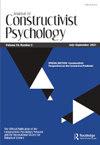Eco-Anxiety: A Cascade of Fundamental Existential Anxieties
IF 0.7
4区 心理学
Q3 PSYCHOLOGY, CLINICAL
引用次数: 8
Abstract
Abstract Eco-anxiety is the experience of persistent feelings of anxiety regarding degradation of our natural environment. Building upon the work of existential psychologists and our own Eco-Existential Positive Psychology framework, we consider how eco-anxiety engenders the existential anxieties of identity, happiness, meaning, death, freedom, and isolation. Regarding identity, ever-shrinking biodiversity and the threat this poses to the existence of our species has made us contemplate our nonbeing, and with that our identity as beings. Our happiness, too, is ill-affected by reduced opportunities to engage with thriving ecosystems as a result of climate crises. Our sense of coherence, connectedness, and continuity—and therefore, meaning in life—is diminished as landscapes and ecosystems that we have become attached to over time become degraded and disrupted. Mounting environmental crises conjure fears of death, including the possible mortality of our human species as a collective. While nature has long been associated with freedom of human behavior and spirit, a broken human–nature relationship leads to an infringement on our autonomy. Finally, the experience of eco-anxiety appears to be a solitary one, heightening our sense of isolation. We discuss implications of these existential threats, emphasizing that ecoanxiety is something with which we need to cope and live.生态焦虑:一系列基本的存在焦虑
摘要生态焦虑是对自然环境退化的持续焦虑感。在存在主义心理学家的工作和我们自己的生态存在主义积极心理学框架的基础上,我们考虑了生态焦虑如何产生身份、幸福、意义、死亡、自由和孤立的存在主义焦虑。关于身份,不断缩小的生物多样性及其对我们物种生存构成的威胁,让我们思考我们的非存在性,以及我们作为生物的身份。由于气候危机,我们参与繁荣生态系统的机会减少,我们的幸福感也受到了不利影响。随着时间的推移,我们所依附的景观和生态系统变得退化和破坏,我们的连贯性、连通性和连续性——以及生命的意义——都会减弱。日益严重的环境危机引发了对死亡的恐惧,包括我们人类作为一个集体可能的死亡。尽管自然长期以来一直与人类行为和精神的自由联系在一起,但破坏的人与自然的关系会侵犯我们的自主权。最后,生态焦虑的经历似乎是孤独的,加剧了我们的孤独感。我们讨论了这些生存威胁的含义,强调生态焦虑是我们需要应对和生活的东西。
本文章由计算机程序翻译,如有差异,请以英文原文为准。
求助全文
约1分钟内获得全文
求助全文
来源期刊

Journal of Constructivist Psychology
PSYCHOLOGY, CLINICAL-
CiteScore
2.40
自引率
0.00%
发文量
22
期刊介绍:
Psychology and related disciplines throughout the human sciences and humanities have been revolutionized by a postmodern emphasis on the role of language, human systems, and personal knowledge in the construction of social realities. The Journal of Constructivist Psychology is the first publication to provide a professional forum for this emerging focus, embracing such diverse expressions of constructivism as personal construct theory, constructivist marriage and family therapy, structural-developmental and language-based approaches to psychology, and narrative psychology.
 求助内容:
求助内容: 应助结果提醒方式:
应助结果提醒方式:


